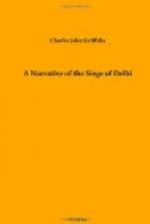Lord Canning, his Council and law advisers, all civilians sitting quietly at Calcutta, living in ease and comfort far from the dangers of war, thought, forsooth, that the Delhi army, struggling for existence for months, fighting to uphold British rule in India—nay, for the very lives and safety of these civilian judges—and at last victorious in the contest, would rest content with their decision.
It is needless to say that this roused a storm of indignation not only amongst the Delhi force, but throughout the British army in India—a burst of resentment which, reaching the Governor-General, made him pause and reconsider his ill-timed and unjust decision. Suffice it to say that the order was rescinded, and that the prize-money, in addition to six months’ batta, was granted to all engaged.
The day that the news of the first decision of the Government arrived at Delhi, when all at that place were full of the wrong done to the army, a private soldier of the 60th Rifles, inspired by the most exquisite sense of humour as well as of bitter satire, wrote upon the walls of the palace where his regiment was quartered the following appropriate sentence: “Delhi taken and India saved for 36 rupees 10 annas.” It is said that the Governor-General demanded the name of this waggish soldier, with the intention that he might receive punishment for his daring effrontery; but it is needless to say that the author of the joke remained unknown save to a few of his comrades; and the great ruler of Hindostan was forced to rest content and ponder over the hidden sarcasm and bitter irony addressed to one in his exalted position.
The army was further promised by the Government 5 per cent, on the whole amount of the prize-money till the amount should be paid. This, during the many years which elapsed before the money was distributed, would have reached a large sum; but faith was broken and the sum repudiated—another instance of want of gratitude to soldiers who, looked to maintain their country’s honour in time of war, are in peace, and when danger is at an end, soon forgotten. So prolonged, also, was the delay in payment of the prize-money that, I recollect, the Times, in reference to this subject about 1860 or 1861, had a leading article in its columns recommending the Delhi army to bring an action against the Government for the payment of the prize. Such action, of course, would have been without precedent, but it showed the feeling of many in the country when the leading journal thought right to draw attention to the subject with a view to the adjustment of the army’s rightful claim.
To return to General Wilson’s order of September 7. Notices were circulated throughout the camp in every brigade and regiment, calling on the troops to elect prize agents for gathering and receiving prize after the capture of the city. These prize agents, therefore, were selected by the army, one for the general and field officers, the second for the Queen’s service of all ranks below that of Major, and the third for the company’s army. The officers appointed, including Captain Fagan, and after his death Doctor Innes, Sir Edward Campbell, of the 60th Rifles, and Captain Wriford, of the 1st Bengal Fusiliers, were all most popular men, and considered in every way fit for the very important duties they had to perform.




